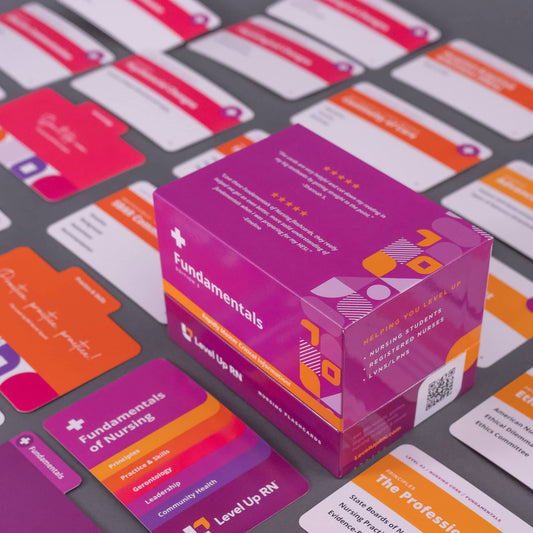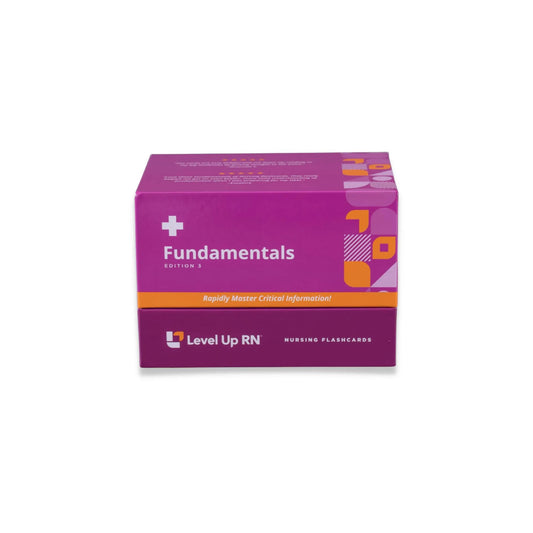In this article, we'll explain two important nursing fundamentals topics: advanced directives and HIPAA regulations. You'll learn about the PSDA, advanced directive types including a DNR, a living will, a POLST, and durable power of attorney.
The Fundamentals of Nursing video series follows along with our Fundamentals of Nursing flashcards, which are intended to help RN and PN nursing students study for nursing school exams, including the ATI, HESI, and NCLEX.
Fundamentals of Nursing - Flashcards
Advance Directives
Advanced directives are legal documents that communicate preferences regarding medical care if the patient becomes incapacitated or is unable to communicate their wishes.
Patient Self Determination Act
The Patient Self-Determination Act (PSDA) is a legal act that guarantees that a patient has the right to make their own decisions about their healthcare, which can include things like the right to refuse and advanced directives.
The PSDA is a legal act that supports the nursing ethical principle of autonomy. The rest of the nursing ethical principles you will need to know for your nursing exams are covered in our Fundamentals of Nursing Flashcards! Laws and ethics are different. Ethical principles do not always have laws that support them, but it is nice when they do, because it can make acting in accordance with these principles easier to navigate and understand.
The PSDA's relationship to advanced directives is that it mandates that patient advanced directives be followed, assuming they are valid and permissible by state law.
Types of Advance Directives
Advanced directives are directives (instructions) made a patient, in advance of the patient becoming incapacitated or unable to verbalize or communicate, regarding how they should be cared for. There are several types of advance directives, including a living will, a do not resuscitate order, physician's orders for life-sustaining treatment (POLST), and durable power of attorney.
For example, if a patient is incapacitated or brain-dead, they have already legally expressed their wishes using one of these methods, then their care team and family members know what to do. The patient has expressed specific wishes that they want the care team and family to follow.
The following types of advanced directives will likely be in your nursing exams, and you will encounter them in your nursing practice.
Living Will
A living will is a document, drawn up by a patient* that indicates the types of medical interventions they do and don't want to have if they were incapacitated and unable to provide consent for themselves.
The type of will you have probably heard of, a Last Will (and Testament) is different from a living will. A last will directs the distribution of assets and burial/cremation after someone has died. A living will gives directions regarding medical interventions if they are no longer able to express informed consent.
The advance directives that can be included in a living will are directives that indicate a patient's desired or prohibited medical interventions including code status, level of intervention, or life-sustaining measures.
For example, a patient could include that they don't wish to be intubated, but they do wish to have tube feedings.
*In some states, patients require witnesses or a notary public to authorize their living will for it to be enforceable. In 26 states, a living will is not enforceable if a patient is pregnant.
Do Not Resuscitate Order
A Do Not Resuscitate Order is a specific type of advance directive stating that no CPR or resuscitative actions should be taken on a patient. This varies by state and you should make yourself familiar with the different DNR options available in your state. But in general, if your patient has a DNR order and goes into cardiac arrest, you would not begin CPR.
For a nurse to be able to act in accordance with a DNR, the order for a DNR must be put in the patient's chart by a physician, which is called a Physician's Orders for Life Sustaining Treatment (POLST), described below.
Physician's Orders for Life-Sustaining Treatment (POLST)
A Physician's orders for life-sustaining treatment (POLST) is a written medical order that summarizes a patient's wishes regarding medical care. A POLST form is often bright pink or another bright color.
POLST may contain a DNR, or may indicate "comfort care only."
POLST as a method/approach began in Oregon in 1991, and is active or in development in most states. Unlike a living will or durable power of attorney, which indicate a patient's preferences, a POLST is a medical order.
Durable Power of Attorney
Durable power of attorney is a legal document that identifies another person, or people, responsible for medical decision-making for a patient.
For example, a patient with a durable power of attorney in place may have designated their spouse or child as the legal decision-maker in giving consent for their medical treatments. This person does not have to be related to the patient.
Durable power of attorney is also called medical power of attorney, healthcare power of attorney, depending on the state.
The Health Insurance Portability and Accountability Act (HIPAA)
The Health Insurance Portability and Accountability Act (HIPAA) of 1996 is a federal law that required the creation of national standards that include protecting a patient's right to privacy and regulating how their health care information is used and disclosed.
HIPPAA also covers modernizations to the flow of healthcare information between institutions and insurance companies as well as limitations on health insurance coverage, but the main areas of HIPAA that you will need to know in a Fundamentals of Nursing course are all regarding a patient's right to privacy and how their healthcare information is used and disclosed.
As Meris notes in the video, this information is highly testable—likely to show up on your nursing exams!
Key Provisions
The key provisions of HIPAA regarding a patient's right to privacy and how their information must be handled are:
- Patient information may NOT be disclosed to anyone that is not directly involved in the care of the patient without patient consent.
- Patients have a right to receive a copy of their health records
Directly involved in the care of the patient means providing direct patient care, such as a physician, respiratory therapist, yourself as the patient's nurse. But not, for example, another nurse on a different unit who is not providing care to that patient.
Furthermore, if your patient's spouse wants information on their lab work or their medicines, that is permissible only if the patient has signed a release of information indicating that you are allowed to share that information with that person. So you would not communicate the protected health information of your patients unless you have a signature saying it's ok to communicate that information to that person.
Best practices for protecting patient privacy
There are some best practices that have been established as a result of HIPAA on how to protect a patient's privacy. Practicing nurses and students in clinical should remember and follow these best practices (which you will likely be tested on).
Electronic health record security
- Log off the computer when stepping away from it. You must actually log off, not just turn the screen off.
- Use secure, unique passwords and change them frequently. You have made enough online passwords by now to know what a secure password is!
- Never share passwords, including with your manager.
- You can only access charts for the patients you are directly caring for. So you can't look up charts for a friend of yours, or a celebrity in the hospital—this would not be an appropriate use of a patient's health record
Verbal security
- Only discuss patient information in a secure environment, like a nurses' station or break room.
- Do not discuss patient information in a public place, like an elevator or hospital cafeteria.
Reporting
Report any breaches of confidentiality of a patient's protected information.
Accidents do happen. You may break confidentiality accidentally (or witness someone else break it accidentally or intentionally). If that happens, hold yourself and others accountable and report that breach to your direct supervisor. It's uncomfortable, but very important.



1 comment
Thank you very much Meris for your wonderful videos everything is clear and helpful!!!!!